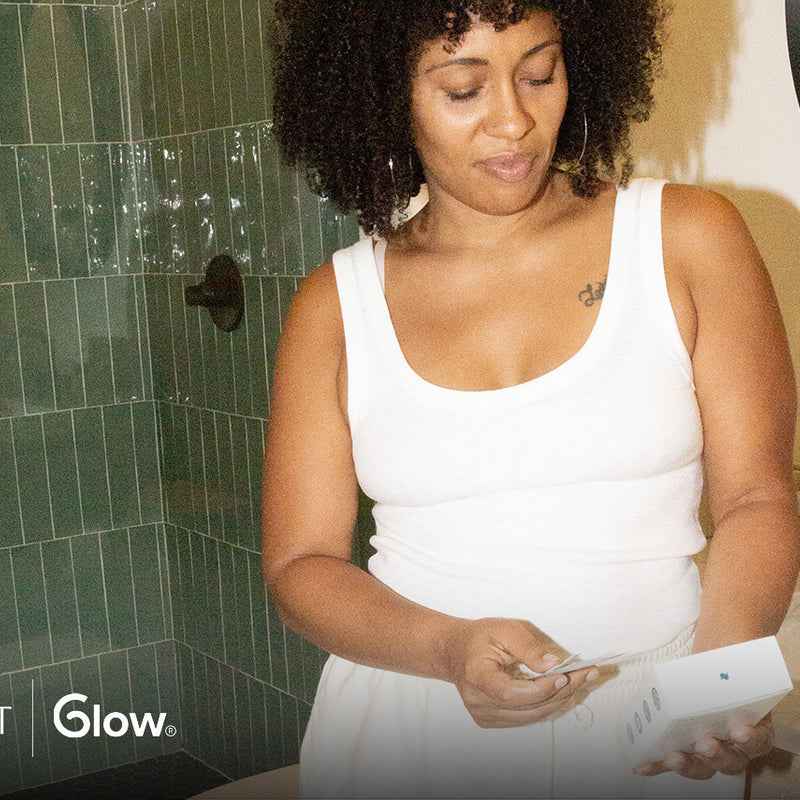Signs Of High Fertility In A Woman

Originally published 06/29/2021. Updated for accuracy and relevancy on 08/23/2023.
By OBGYN and fertility expert Dr. Kenosha Gleaton
Knowing how fertile you are is a key first step when trying to get pregnant. Whether you’re super fertile, have high fertility or low fertility, there are various tests and products that can help you on this journey.
What Does Fertility Mean?
Fertility is the ability to conceive, whereas infertility is the inability to establish a clinical pregnancy after 12 months of regular, unprotected sex. [1]
For females, fertility is especially focused on egg and uterine health, AKA the ability to ovulate and get pregnant. For males, fertility is especially focused on sperm health and the ability for sperm to fertilize an egg.
Can You Be “Super" Fertile?
It’s true that fertility is genetic, and there actually are some people who can be classified as “super” fertile. [2] Fertility is all dependent on sperm and egg health.
One study on the topic classified super fertility as having a monthly fecundity rate (the ability to get pregnant) of 60% or greater. [3] If you are born with an abnormally high egg or sperm count, have an extremely regular cycle, or have many healthy eggs in older age, you could be “super” fertile.
6 Signs of High Fertility
Wondering if you have high or low fertility? There are some clues to determine how fertile you are:
- High antral follicle count: Your doctor can see your antral follicles via transvaginal ultrasound, and research has found that a higher number of active antrum follicles on the ovaries correlates to a high ovarian reserve. [4]
- Regular cycles: If you have a regular cycle, it’s a lot easier to identify when you’ll be ovulating, and when you should be having sex. This greatly increases your chances of conceiving.
- Positive ovulation tests each month: If you’re getting consistent positive ovulation test results, this means you have a regular ovulatory cycle and have a higher chance of getting pregnant.
- Changes in your cervical mucus: Cervical mucus changes before and during ovulation, taking on a texture and color similar to egg whites, and a stretchy or slick consistency. This change indicates peak fertility and helps sperm navigate toward the egg, as well as making sex more enjoyable.
- Periods aren’t very heavy or painful: Tracking period symptoms can help a person determine if you are dealing with any chronic gynecological conditions that may affect fertility.
- Healthy levels of anti-mullerian hormone: An AMH test provides insight into the number of eggs you have left and can determine if your ovaries are showing signs of early aging. [5]
Signs of Poor Fertility
On the other hand, there are some signs of low fertility as well:
- Menopause: Going through menopause or perimenopause means you will soon be unable to conceive. Menopause usually starts in the mid-late 40’s but can happen earlier. Read 24 Signs of Perimenopause.
- Fibroids: Non-cancerous uterine tumors, known as fibroids, aren’t incredibly dangerous, but they are common and they can impact fertility. [6] Depending on the location of the fibroids, your ability to conceive and sustain pregnancy could be decreased.
- Endometriosis: Conceiving with endometriosis isn’t impossible, but you may have more issues than most when trying to get pregnant. There are some pregnancy complications to be wary of, including preterm labor and miscarriage. If you have endometriosis and are trying to conceive, I recommend talking to your doctor to find out what testing and products can help.
- PCOS: Polycystic ovarian syndrome (PCOS) typically causes abnormal ovulation, meaning it may create some challenges when trying to conceive. If you’d like to learn more, we have a whole article about getting pregnant with PCOS.
How to Track Fertility
If you’re attempting to track fertility, you’ll want to purchase some ovulation tests. Ovulation tests or ovulation predictor kits (OPK) are urine tests that indicate when you’re ovulating, AKA your fertile period.
Cervical mucus tracking is another way to track fertility (and it’s free!). Your cervical mucus can show how fertile you are in the present moment. You’re most fertile when mucus is transparent, stretchy/elastic, slippery, and wet.
Supplements to Support Fertility
There are many factors that may potentially improve your chances of getting pregnant, from using a TTC-safe fertility lubricant to maintaining a well-balanced diet and a healthy weight. But some people may have nutritional deficiencies that can make getting pregnant more difficult. Here are the most popular supplements that women take to increase prenatal health:
- Coq10: A natural antioxidant that supports both female and male fertility. CoQ10 improves egg and sperm health and may also improve IVF outcomes. [7-9]
- MTHF Folate: Folate is recommended by ACOG and the CDC for improved pregnancy outcomes, can reduce the risk of infertility, fight environmental toxins, and can improve fertility treatment success rates. [10-11]
- DHA: Omega fatty acids are necessary for building neural tissue, and DHA helps to support healthy pregnancy outcomes. [11] Natalist’s DHA supplement exceeds ACOG’s recommendations for pregnancy, and promotes healthy fetal development in a non-fishy capsule
- Vitamin D: Healthy vitamin D levels are beneficial for female and male fertility and are associated with higher IVF success. [12] Our vitamin D gummies for adults are not only healthy but support healthy teeth, bones, and immune function.
When to Consult a Doctor
If you’re trying to get pregnant and having difficulty conceiving, you may want to consult a fertility expert. For women under age 35, we recommend seeking help after 12 months of trying to conceive. For women over 35, we recommend a shorter time period: six months.
You may want to seek help before then if you have irregular menstrual cycles, have experienced two or more miscarriages, have a family history of premature menopause, or a history of ovarian surgery or endometriosis.
If you’re concerned about your fertility, read our guide on how to know when it’s time to see a fertility specialist.
Fertility Tests for Women and Men
Interested in what tests you and your partner can take to determine fertility?
- Sperm analysis: This at-home sperm analysis is a clinical grade test that looks at five factors of sperm health.
- Sonogram: An ultrasound of the pelvic area can identify any anatomical issues relating to fertility such as uterine shape, ovarian health, etc.
- Hormone testing: A blood test can determine your hormone levels to make sure they are in balance.
- Ovarian reserve test: Ovarian reserve testing may consist of three or more tests including an FSH, AMH, or antral follicle count. These tests identify how many eggs are present in the ovaries as well as the quality of those eggs. However, keep in mind the quantity of eggs is not as important as the quality.
Key Takeaways
- Super fertility has been classified as a monthly fecundity (the ability to get pregnant) rate of 60% or greater.
- A regular menstrual cycle and high antral follicle count are signs of high fertility.
- Perimenopause, fibroids, and endometriosis can make conceiving and sustaining pregnancy more difficult.
- Ovulation tests and cervical mucus tracking are two ways to narrow down your fertile window
- Some supplements like CoQ10, Vitamin D, and DHA are beneficial for reproductive health and may support fertility.
Sources:
- Vander Borght M, Wyns C. Fertility and infertility: Definition and epidemiology. Clin Biochem. 2018;62:2-10. doi:10.1016/j.clinbiochem.2018.03.012
- Ruth KS, Murray A. Lessons from Genome-Wide Association Studies in Reproductive Medicine: Menopause. Semin Reprod Med. 2016;34(4):215-223. doi:10.1055/s-0036-1585404
- Orlando J, Coulam C. Is superfertility associated with recurrent pregnancy loss?. Am J Reprod Immunol. 2014;72(6):549-554. doi:10.1111/aji.12280
- G.J. Scheffer and others, The number of antral follicles in normal women with proven fertility is the best reflection of reproductive age, Human Reproduction, Volume 18, Issue 4, April 2003, Pages 700–706, https://doi.org/10.1093/humrep/deg135
- Anti-Mullerian Hormone Test. Cleveland Clinic. April 2022. URL.
- Cardozo ER, Clark AD, Banks NK, Henne MB, Stegmann BJ, Segars JH. The estimated annual cost of uterine leiomyomata in the United States. Am J Obstet Gynecol. 2012;206(3):211.e1-211.e2119. doi:10.1016/j.ajog.2011.12.002
- Akarsu S, Gode F, Isik AZ, Dikmen ZG, Tekindal MA. The association between coenzyme Q10 concentrations in follicular fluid with embryo morphokinetics and pregnancy rate in assisted reproductive techniques [published correction appears in J Assist Reprod Genet. 2017 May;34(5):607]. J Assist Reprod Genet. 2017;34(5):599-605. doi:10.1007/s10815-017-0882-x
- Salas-Huetos A, Rosique-Esteban N, Becerra-Tomás N, Vizmanos B, Bulló M, Salas-Salvadó J. The Effect of Nutrients and Dietary Supplements on Sperm Quality Parameters: A Systematic Review and Meta-Analysis of Randomized Clinical Trials. Adv Nutr. 2018;9(6):833-848. doi:10.1093/advances/nmy057
- Zhang Y, Zhang C, Shu J, et al. Adjuvant treatment strategies in ovarian stimulation for poor responders undergoing IVF: a systematic review and network meta-analysis. Hum Reprod Update. 2020;26(2):247-263. doi:10.1093/humupd/dmz046
- Chavarro JE, Rich-Edwards JW, Rosner BA, Willett WC. Use of multivitamins, intake of B vitamins, and risk of ovulatory infertility. Fertil Steril. 2008;89(3):668-676. doi:10.1016/j.fertnstert.2007.03.089
- Gaskins AJ, Mínguez-Alarcón L, Fong KC, et al. Supplemental Folate and the Relationship Between Traffic-Related Air Pollution and Livebirth Among Women Undergoing Assisted Reproduction. Am J Epidemiol. 2019;188(9):1595-1604. doi:10.1093/aje/kwz151
- Lerchbaum E, Obermayer-Pietsch B. Vitamin D and fertility: a systematic review. Eur J Endocrinol. 2012;166(5):765-778. doi:10.1530/EJE-11-0984
Sign Up For 10% Off Your First Order!
Sign up for insider access, exclusive deals, and OBGYN insights!
Reach Out, We're Here
Have questions about your order or products? For the speediest answer, check out our FAQ section. Need something else? Come find us below.
Customer Support
support@natalist.com
Press Inquiries
media@everlyhealth.com
Business & Partnerships
team@natalist.com
Affiliates + Influencers
team@natalist.com
Job Openings
Careers Page






















